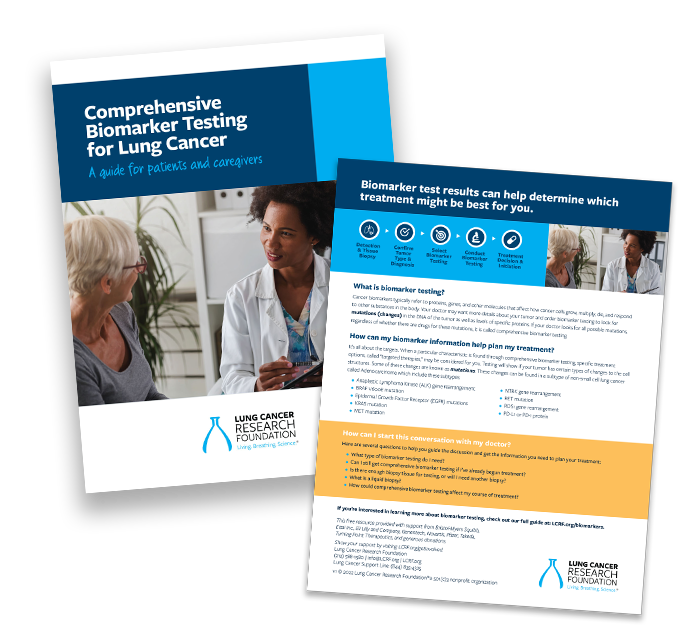Biomarker test results can help determine which treatment might be best for you.

The information on this page is available from LCRF as a printed brochure. Click here to download or order.
In addition, our complete guide to biomarkers is also available. The guide in web format can be found here.
What is biomarker testing?
Cancer biomarkers typically refer to proteins, genes, and other molecules that affect how cancer cells grow, multiply, die, and respond to other substances in the body. Your doctor may want more details about your tumor and order biomarker testing to look for mutations (changes) in the DNA of the tumor as well as levels of specific proteins. If your doctor looks for all possible mutations, regardless of whether there are drugs for these mutations, it is called comprehensive biomarker testing.
Biomarker testing step by step

How can my biomarker information help plan my treatment?
It’s all about the targets. When a particular characteristic is found through comprehensive biomarker testing, specific treatment options, called “targeted therapies,” may be considered for you. Testing will show if your tumor has certain types of changes to the cell structures. Some of these changes are known as mutations. These changes can be found in a subtype of non-small cell lung cancer called Adenocarcinoma which include these subtypes:
- Anaplastic Lymphoma Kinase (ALK) gene rearrangement
- BRAF V600E mutation
- Epidermal Growth Factor Receptor (EGFR) mutations
- KRAS mutation
- MET mutation
- NTRK gene rearrangement
- RET alteration (fusion)
- ROS1 gene rearrangement
- PD-L1 or PD-1 protein
How can I start this conversation with my doctor?
Here are several questions to help you guide the discussion and get the information you need to plan your treatment:
- What type of biomarker testing do I need?
- Can I still get comprehensive biomarker testing if I’ve already begun treatment?
- Is there enough biopsy tissue for testing, or will I need another biopsy?
- What is a liquid biopsy?
- How could comprehensive biomarker testing affect my course of treatment?
If you’re interested in learning more about biomarker testing, check out our full guide at: LCRF.org/biomarkers.
Have questions or need further information? Contact LCRF’s lung cancer support line at (844) 835-4325 or email support@LCRF.org.
These educational materials are provided at no cost to you, with support from Bristol-Myers Squibb, Eli Lilly and Company, The Janssen Pharmaceutical Companies Contributions Fund at the Johnson & Johnson Foundation (JJF), and other generous donations.